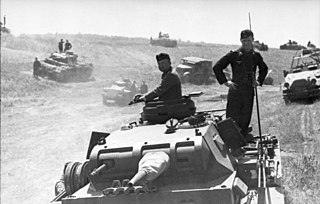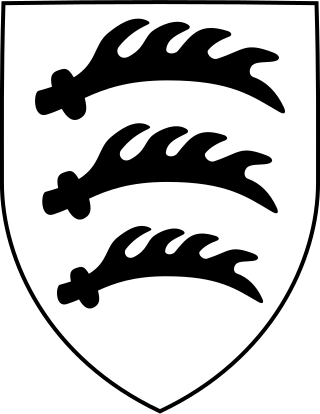
This article details the order of battle of German military units during the invasion of Poland in 1939.

The 13th Panzer Division was a unit of the German Army during World War II, established in 1940.

The 60th Infantry Division was formed in late 1939, from Gruppe Eberhardt, a collection of SA units that had been engaged in the capture of Danzig during the Invasion of Poland. This division was unusual in that its manpower was largely drawn from the SA and the police.

The 334th Infantry Division was a German Army infantry division in World War II. Originally formed in November 1942, it surrendered to the Allies at the conclusion of the Tunisian Campaign in May 1943. The division was reconstituted on 3 June 1943 in France within the 1st Army, with the staff of the 80th Infantry Division as well as remnants of the old division and replacement units. It spent the remainder of the war serving on the Italian Front.

The 1st Mountain Division was an elite formation of the German Wehrmacht during World War II, and is remembered for its involvement in multiple large-scale war crimes. It was created on 9 April 1938 in Garmisch Partenkirchen from the Mountain Brigade which was itself formed on 1 June 1935.
The 4th Mountain Division was a mountain infantry division of the Heer, the army of the Wehrmacht of Nazi Germany during World War II. The division was active between October 1940 and May 1940 and participated in the Balkans campaign as well as on the Eastern Front.

The 5th Mountain Division was a formation of the German Wehrmacht during World War II. It was established in the Wehrkreis XVIII in October 1940, out of units taken from the 1st Mountain Division and the 10th Infantry Division. The unit surrendered to the U.S. Army near Turin in May 1945.

The 6th Mountain Division was a German army Division of World War II. It was established in June 1940, and was deployed to France for occupation duties. In December it was relocated to Poland, where it remained until the spring of 1941. Having formed XVIII Mountain Corps with the 5th Mountain Division, it then took part in Operation Marita, the invasion of Greece during the Balkans Campaign. In September it was relocated to northern Finland, where it operated in Lapland. From July 1942 onward it was part of the 20th Mountain Army along the Arctic coast. It withdrew into Norway when the Germans evacuated Finland in late 1944, and surrendered to the British at the end of the war in 1945.

The 100th Jäger Division, initially designated 100th (Light) Infantry Division, was a light infantry division of the German Army during World War II. As such, it was provided with partial horse or motor transport and lighter artillery. Light divisions were reduced in size compared to standard infantry divisions. The Walloon Legion was briefly attached to this division from January 1942 to May 1942. During the latter stages of the war, the division was composed of members from most of Germany's geographic areas and many German-speaking Walloons (Belgian/French) and the People from Upper Silesia

The 26th Infantry Division was a pre-World War II German Infantry Division of the 1st mobilisation wave. It was mobilised for World War II on September 26, 1939, disbanded on September 10, 1944, near Radom and reformed as the 26th Volksgrenadier Division on September 17, 1944, near Poznań by absorption of the new 582nd Volksgrenadier Division of the 32nd mobilisation wave. Remnants of the Division entered U.S. captivity in the Harz region in 1945.
The Alpenkorps was a provisional mountain formation of division size formed by the Imperial German Army during World War I. It was considered by the Allies to be one of the best in the German Army.
The 21st Infantry Division was a German military unit which fought during World War II.

The 25th Infantry Division was a military unit of the German Wehrmacht. It was later reclassified to 25th Motorized Infantry Division, and in June 1943 to the 25th Panzergrenadier Division.

The 8th Mountain Division was formed on 27 February 1945 by the redesignation of the 157th Mountain Division, which itself had been formed from the 157th Infantry Division in September 1944, and which had participated in operations against the maquis of Vercors. The division was stationed in France until the Italian surrender when it then moved to Italy taking 5,772 prisoners in two days during the disarmament of the Italian Army. The division remained in Italy for the rest of the war and surrendered to the Americans in April, 1945.

The 97th Jäger Division was a light infantry Division of the German Army during World War II. It can trace its origins to the 97th (Light) Infantry Division which was formed in December 1940. It was then redesignated the 97th Jäger Division in July 1942.

The 34th Infantry Division,, was a German military unit that fought in the Battle of France and on the Eastern Front during World War II. The division was first formed following the expansion of the army under Adolf Hitler's leadership, but finally disbanded following their surrender to the Americans in Italy.

The 214th Infantry Division was a German division in World War II. It was formed on 26 August 1939.

The 134th Infantry Division was a German division in World War II. It was formed in October 1940.
The 181st Infantry Division was a German division in World War II. It was formed on 1 December 1939. The division participated in anti-partisan operations in World War II in German-occupied Yugoslavia.

The 256th Infantry Division was a German infantry division in World War II. They formed in August 1939 as part of the 4. Welle (wave). The division was destroyed at Vitebsk in June 1944 during Operation Bagration. The remnants of the division formed Divisions-Gruppe 256 which was assigned to Korpsabteilung H.
















